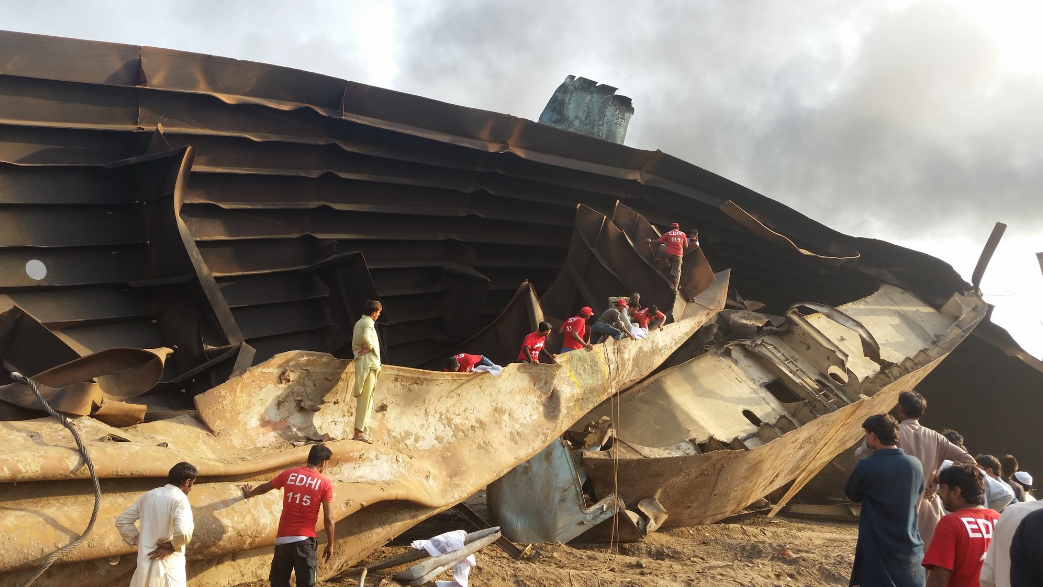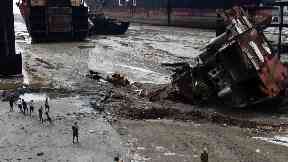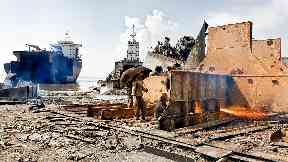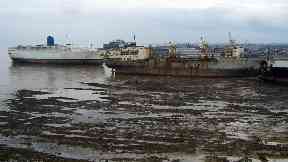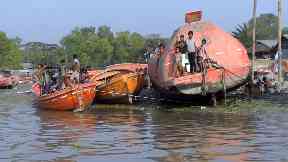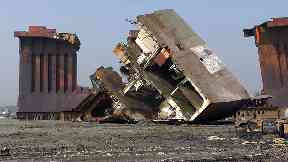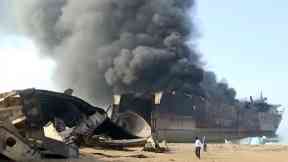Nobody wants a shipwrecker in their front yard.
 |
The HMCS Preserver, shown
here in drydock at Halifax Shipyards, will soon be broken up at the Sydport
Industrial Park. (Staff)
|
The mere word conjures up images of leaking oil, rusted
debris and overseas workers whose lives, in the absence of environmental
regulation, are shortened by heavy metals and contaminated fluids. That may
have driven Coun. Earlene McMullin’s displeasure during the Cape Breton
Regional Municipality council meeting Tuesday.
“I’ve got a little bit of shake in my voice because it’s
killing me to sit here and spend council’s time to get clarification on whether
ships can be destroyed downtown on Commercial Street,” McMullin said. “I’ll
breathe through the enragement, but it just seems so backward that I have to do
that.”
McMullin was complaining about differing opinions she
received from CBRM staff on whether Canadian Marine Engineering — which bought
a waterfront park in downtown North Sydney from the municipality two years ago,
bulldozed it and built a marine lift and repair shop — was legally entitled to
also cut up ships for scrap metal.
So she asked again in public: “Where CME is located on
Commercial Street, does the zoning permit either recycling or breaking of
steel-hulled vessels, or any vessel, for that matter?”
“No,” answered planning director Malcolm Gillis.
The rumour that CME wanted to break ships in McMullin’s
neighbourhood was sparked by a Transport Canada report that mentioned the
company’s capacity for recycling ships of up to 2,500 tonnes.
But as Coun. Kendra Coombs pointed out, CME staff said
they don’t intend to break ships in North Sydney, and as Gillis noted, CME owns
facilities at other locations, including Dartmouth and Victoria, B.C. where it
might be interested in doing that.
The not-in-my-backyard attitude to shipwrecking has not
spread to the Sydport Industrial Park, where another company, Marine Recycling,
began this week to break up the newly-arrived HMCS Preserver.
The first ship to come to Sydney to “die” in decades, the
Preserver is around the 130th for MRC, which was founded by Wayne Elliot in
Port Colborn, Ont.
Elliot hoped four years ago to expand to Sydney but after
being denied two aged ferries from Marine Atlantic, which has a terminal in
downtown North Sydney, he waited, knowing another chance would come along.
“Our federal government decided that Canadian-flagged
vessels and government-owned vessels should be recycled in Canada to promote
safe recycling as well as provide jobs and raw materials, and not ship those
things offshore,” Elliot said.
“There are warships just coming to their end this year,
and in a number of years down the road I suppose the frigates will start to be
recycled. There are Coast Guard vessels and Department of Fishery vessels, and
of course commercial vessels . . the biggest source of our work.”
In Sydney, MRC’s worksite is “not a very large space,
really,” Elliot said. “A couple of acres and, of course, the dock. There won’t
be materials stored on site. Once the material is processed . . . it will be
shipped off site.
“Most of the ship components are metal. . .
“Metal is infinitely recyclable. What today is your
vehicle may tomorrow be razor blades or something else. The beauty with metal
recycling is the energy saving and of course the savings to the environment.”
When MRC recycles a ship, no part of it ends up in the
water, he said. “Before we tow, liquids, oils or any water are removed from the
vessel . . . We’ve done a number of successful tows since the new regulations
and we’re very much in favour of them.
“When vessels do have accidents, sinkings, it’s those
hydrocarbons that just keep on giving the carnage and so we’re fully supportive
of that regulation.”
The company has had one major loss, in 2010, when a
submarine caught fire as it was being dismantled, Elliot described that as a
“freak accident” caused by floating debris.
“If safety is not first and foremost in this business,
then one may not be in it too long. We’re very proud of our record. We’re the
world’s oldest ISO certified ship recycler, since 2000.”
MRC was an unpaid consultant to Canada’s member of the
Basel and Hong Kong Conventions when they were setting the rules and the
policies around shipbreaking, Elliot said.
“It has become an
environmental business, shipbreaking has. Other parts of the world that are
sadly lacking in safety and environmental stewardship have begun to improve
their operations. So, it’s all headed in the right direction.”
Source: the
chronicle herald. 15 August 2017

